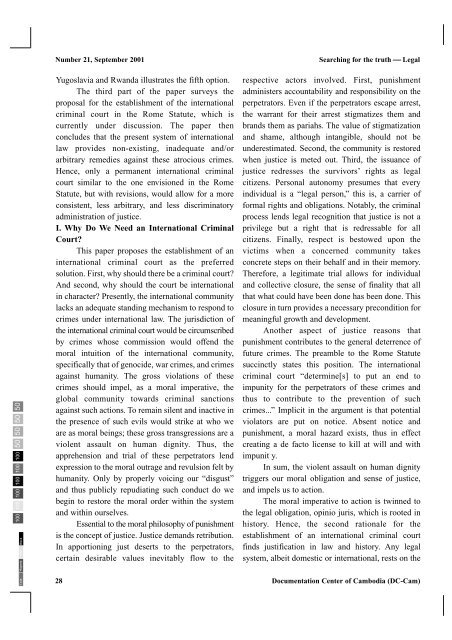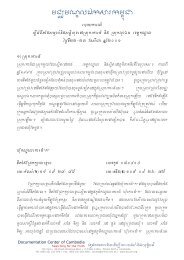Searching for the truth Issues 21 - Documentation Center of Cambodia
Searching for the truth Issues 21 - Documentation Center of Cambodia
Searching for the truth Issues 21 - Documentation Center of Cambodia
Create successful ePaper yourself
Turn your PDF publications into a flip-book with our unique Google optimized e-Paper software.
100 100 100 100 100 100 50 50 50 50<br />
Black<br />
Yellow<br />
Magenta<br />
Cyan<br />
Number <strong>21</strong>, September 2001<br />
Yugoslavia and Rwanda illustrates <strong>the</strong> fifth option.<br />
The third part <strong>of</strong> <strong>the</strong> paper surveys <strong>the</strong><br />
proposal <strong>for</strong> <strong>the</strong> establishment <strong>of</strong> <strong>the</strong> international<br />
criminal court in <strong>the</strong> Rome Statute, which is<br />
currently under discussion. The paper <strong>the</strong>n<br />
concludes that <strong>the</strong> present system <strong>of</strong> international<br />
law provides non-existing, inadequate and/or<br />
arbitrary remedies against <strong>the</strong>se atrocious crimes.<br />
Hence, only a permanent international criminal<br />
court similar to <strong>the</strong> one envisioned in <strong>the</strong> Rome<br />
Statute, but with revisions, would allow <strong>for</strong> a more<br />
consistent, less arbitrary, and less discriminatory<br />
administration <strong>of</strong> justice.<br />
I. Why Do We Need an International Criminal<br />
Court?<br />
This paper proposes <strong>the</strong> establishment <strong>of</strong> an<br />
international criminal court as <strong>the</strong> preferred<br />
solution. First, why should <strong>the</strong>re be a criminal court?<br />
And second, why should <strong>the</strong> court be international<br />
in character? Presently, <strong>the</strong> international community<br />
lacks an adequate standing mechanism to respond to<br />
crimes under international law. The jurisdiction <strong>of</strong><br />
<strong>the</strong> international criminal court would be circumscribed<br />
by crimes whose commission would <strong>of</strong>fend <strong>the</strong><br />
moral intuition <strong>of</strong> <strong>the</strong> international community,<br />
specifically that <strong>of</strong> genocide, war crimes, and crimes<br />
against humanity. The gross violations <strong>of</strong> <strong>the</strong>se<br />
crimes should impel, as a moral imperative, <strong>the</strong><br />
global community towards criminal sanctions<br />
against such actions. To remain silent and inactive in<br />
<strong>the</strong> presence <strong>of</strong> such evils would strike at who we<br />
are as moral beings; <strong>the</strong>se gross transgressions are a<br />
violent assault on human dignity. Thus, <strong>the</strong><br />
apprehension and trial <strong>of</strong> <strong>the</strong>se perpetrators lend<br />
expression to <strong>the</strong> moral outrage and revulsion felt by<br />
humanity. Only by properly voicing our “disgust”<br />
and thus publicly repudiating such conduct do we<br />
begin to restore <strong>the</strong> moral order within <strong>the</strong> system<br />
and within ourselves.<br />
Essential to <strong>the</strong> moral philosophy <strong>of</strong> punishment<br />
is <strong>the</strong> concept <strong>of</strong> justice. Justice demands retribution.<br />
In apportioning just deserts to <strong>the</strong> perpetrators,<br />
certain desirable values inevitably flow to <strong>the</strong><br />
28<br />
<strong>Searching</strong> <strong>for</strong> <strong>the</strong> <strong>truth</strong> ⎯ Legal<br />
respective actors involved. First, punishment<br />
administers accountability and responsibility on <strong>the</strong><br />
perpetrators. Even if <strong>the</strong> perpetrators escape arrest,<br />
<strong>the</strong> warrant <strong>for</strong> <strong>the</strong>ir arrest stigmatizes <strong>the</strong>m and<br />
brands <strong>the</strong>m as pariahs. The value <strong>of</strong> stigmatization<br />
and shame, although intangible, should not be<br />
underestimated. Second, <strong>the</strong> community is restored<br />
when justice is meted out. Third, <strong>the</strong> issuance <strong>of</strong><br />
justice redresses <strong>the</strong> survivors’ rights as legal<br />
citizens. Personal autonomy presumes that every<br />
individual is a “legal person,” this is, a carrier <strong>of</strong><br />
<strong>for</strong>mal rights and obligations. Notably, <strong>the</strong> criminal<br />
process lends legal recognition that justice is not a<br />
privilege but a right that is redressable <strong>for</strong> all<br />
citizens. Finally, respect is bestowed upon <strong>the</strong><br />
victims when a concerned community takes<br />
concrete steps on <strong>the</strong>ir behalf and in <strong>the</strong>ir memory.<br />
There<strong>for</strong>e, a legitimate trial allows <strong>for</strong> individual<br />
and collective closure, <strong>the</strong> sense <strong>of</strong> finality that all<br />
that what could have been done has been done. This<br />
closure in turn provides a necessary precondition <strong>for</strong><br />
meaningful growth and development.<br />
Ano<strong>the</strong>r aspect <strong>of</strong> justice reasons that<br />
punishment contributes to <strong>the</strong> general deterrence <strong>of</strong><br />
future crimes. The preamble to <strong>the</strong> Rome Statute<br />
succinctly states this position. The international<br />
criminal court “determine[s] to put an end to<br />
impunity <strong>for</strong> <strong>the</strong> perpetrators <strong>of</strong> <strong>the</strong>se crimes and<br />
thus to contribute to <strong>the</strong> prevention <strong>of</strong> such<br />
crimes...” Implicit in <strong>the</strong> argument is that potential<br />
violators are put on notice. Absent notice and<br />
punishment, a moral hazard exists, thus in effect<br />
creating a de facto license to kill at will and with<br />
impunit y.<br />
In sum, <strong>the</strong> violent assault on human dignity<br />
triggers our moral obligation and sense <strong>of</strong> justice,<br />
and impels us to action.<br />
The moral imperative to action is twinned to<br />
<strong>the</strong> legal obligation, opinio juris, which is rooted in<br />
history. Hence, <strong>the</strong> second rationale <strong>for</strong> <strong>the</strong><br />
establishment <strong>of</strong> an international criminal court<br />
finds justification in law and history. Any legal<br />
system, albeit domestic or international, rests on <strong>the</strong><br />
<strong>Documentation</strong> <strong>Center</strong> <strong>of</strong> <strong>Cambodia</strong> (DC-Cam)












